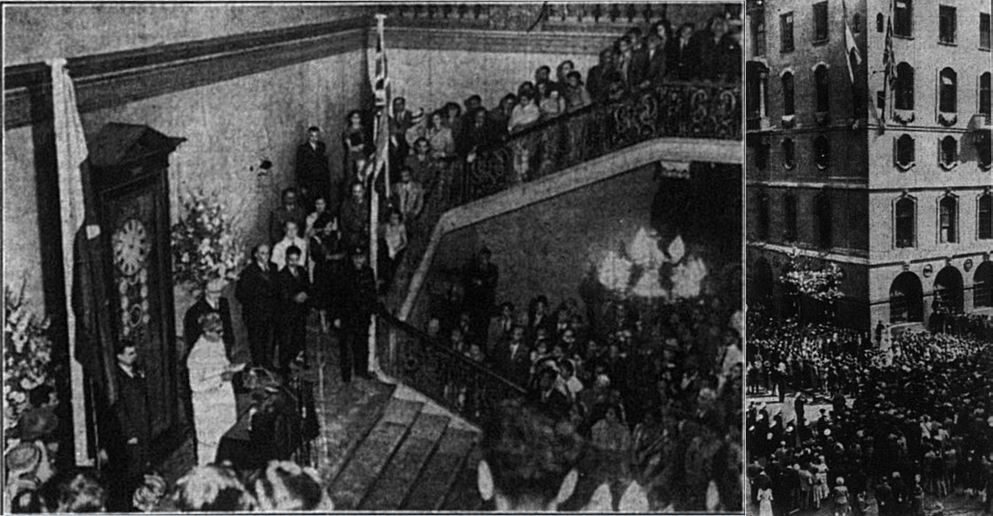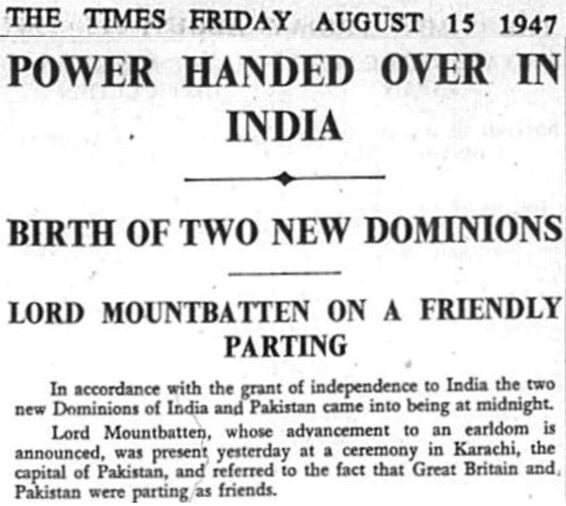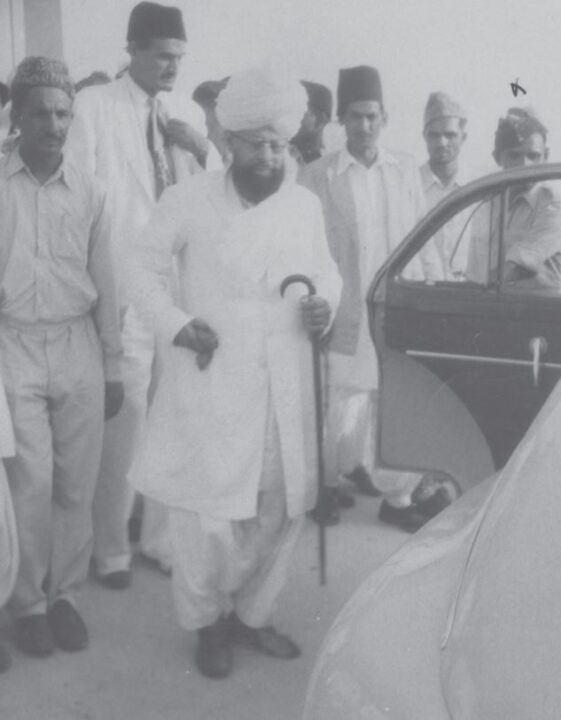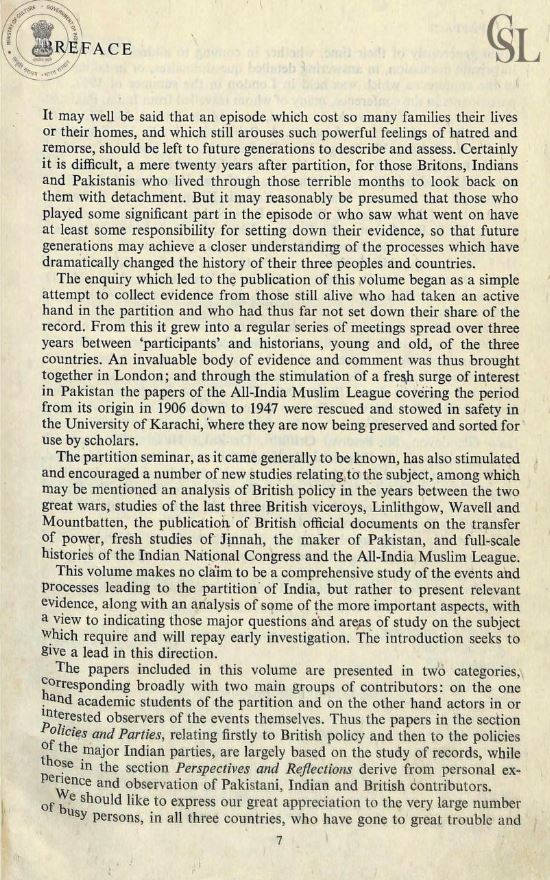Ata-ul-Haye Nasir, Ahmadiyya Archive & Research Centre

The Partition of India
75 years ago, the world witnessed one of the most significant events of modern history.
When all the efforts to grant independence to an “undivided India” failed, the British government was compelled to partition British India into two sovereign dominions: India and Pakistan.
The Times reported:
“Power Handed Over in India
“Birth of Two New Dominions
“Lord Mountbatten on a Friendly Parting
“In accordance with the grant of independence to India, the two new Dominions of India and Pakistan came into being at midnight.
“Lord Mountbatten, whose advancement to an earldom is announced, was present yesterday at a ceremony in Karachi, the capital of Pakistan, and referred to the fact that Great Britain and Pakistan were parting as friends.” (The Times, 15 August 1947, p. 4)

Hazrat Musleh-e-Maud’sra heartfelt wish for India and Pakistan
During his Friday Sermon on 15 August 1947, Hazrat Mirza Bashiruddin Mahmud Ahmad, Khalifatul Masih IIra shed light on the unprecedented significance of this happening.
Huzoorra said:
“This day is like the Yaum-e-Barzakh for [British] India. Today, right after 12 am, India has got freedom from British rule, and now, this country has been divided into two sovereign governments: Indian Dominion and Pakistan. After a long period of 90 years – meaning that if we count it since the time of ghadar [the 1857 mutiny] when the Islamic Kingdom was still intact to some extent in India – this country has got freedom from the rule of a foreign government, and specifically in the case of Punjab, it has been freed from a foreign rule after a hundred years. […]
“Today the Indians can surely feel they have their own government in the country. […] As far as the law or constitution is concerned, every Indian deserves more rights than any foreigner within their country. But before today, a foreigner was deemed more deserving of rights, whereas an Indian was deemed less deserving despite living in their own country. This is such a huge transition that one’s heart is unable to imagine it.” (Al Fazl, 16 August 1947, p. 1)
Huzoorra further said that if this transition had occurred without the painful happenings, then everyone’s heart would have been filled with happiness.
Huzoorra said that along with this freedom, the scenes of violence and oppression were also apparent, and although God Almighty had granted freedom to this country, the country did not free itself from violence and oppression.

In 1967, while shedding light on the painful aspect of the partition of India, CH Philips said:
“It may well be said that an episode which cost so many families their lives or their homes, and which still arouses such powerful feelings of hatred and remorse, should be left to future generations to describe and assess. Certainly, it is difficult, a mere twenty years after partition for those Britons, Indians and Pakistanis who lived through those terrible months to look back on them with detachment.” (The Partition of India: Policies and Perspectives 1935-1947, George Allen and Unwin Ltd., London, p. 7)

Hazrat Khalifatul Masih IIra continued his sermon by saying:
“We have a relationship with both of the newly established governments because the religious communities have no affiliation to a specific country or government. The members of our Jamaat are present in both Pakistan and India as well. Even before this, members of our Jamaat were present in Afghanistan, Iran, Iraq, Syria, Egypt, Sudan, Malaya, Burma, Java, Sumatra, England, United States, East Africa, and West Africa as well. […] Therefore, this transition is not new for our Jamaat, because members of our Jamaat were already living in many different countries as well.
“The only difference is just like there were three brothers in a family, and two of those brothers lived together and did not divide their property either, whereas the third brother had separated. After some time – due to some circumstances – the two brothers who were living together decided to divide their property and live separately. There was no special impact when the first brother got separated, but when these two brothers separate from each other, they will certainly feel some pain in their hearts upon seeing each other’s [new] homes and other arrangements, and their eyes will have tears.
“Therefore, although some of the members of our Jamaat were already living in other countries as well, those brothers who have separated now, used to live together for a long time. Now, we will meet each other just like people from different countries meet each other.
“Thus, on the occasion of this freedom and partition, we pray to God Almighty that He may grant progress to both these countries, enable them both to act with justice and equity and inculcate the spirit of love and affection between the people of both countries. May both countries strive to get better of each other – but through brotherhood, sympathy and sincerity – and in addition to the spirit of competition, they should also have the spirit of cooperation and sympathy.” (Al Fazl, 16 August 1947, p. 2)
Related Content
- Hazrat Musleh-e-Maud’s services to the Muslim cause: Guiding Muslims of the Indian subcontinent amid religious and political conflicts
- Hazrat Musleh-e-Maud’s response to the Shuddhi movement and the Jamaat’s relentless services for Islam
- The Simon Commission, First Round Table Conference and Hazrat Musleh-e-Maud’s valuable guidance
- Freedom is the birthright of everyone: Hazrat Musleh-e-Maud’s guidance regarding India’s independence and partition
- The Wavell Plan and Hazrat Mirza Bashiruddin Mahmud Ahmad’s (ra) call for peace and India’s freedom
- The Simla Conference, 1945: Hazrat Mirza Bashiruddin Mahmud Ahmad’s (ra) guidance prior to the conference and response to its failure
- The Cabinet Mission, 1946: Its background and Hazrat Mirza Bashiruddin Mahmud Ahmad’s (ra) guidance
- The deadlock over Interim Government and Constituent Assembly for India: Its background and Hazrat Mirza Bashiruddin Mahmud Ahmad’s (ra) guidance
- Hazrat Mirza Bashiruddin Mahmud Ahmad’s (ra) services to the Muslim cause: Guidance and support to leaders of the Pakistan Movement

